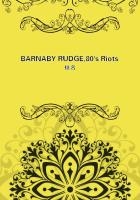
第220章
Besides the notices on the gates of the Fleet and the King's Bench, many similar announcements were left, before one o'clock at noon, at the houses of private individuals; and further, the mob proclaimed their intention of seizing on the Bank, the Mint, the Arsenal at Woolwich, and the Royal Palaces. The notices were seldom delivered by more than one man, who, if it were at a shop, went in, and laid it, with a bloody threat perhaps, upon the counter; or if it were at a private house, knocked at the door, and thrust it in the servant's hand. Notwithstanding the presence of the military in every quarter of the town, and the great force in the Park, these messengers did their errands with impunity all through the day. So did two boys who went down Holborn alone, armed with bars taken from the railings of Lord Mansfield's house, and demanded money for the rioters. So did a tall man on horseback who made a collection for the same purpose in Fleet Street, and refused to take anything but gold.
A rumour had now got into circulation, too, which diffused a greater dread all through London, even than these publicly announced intentions of the rioters, though all men knew that if they were successfully effected, there must ensue a national bankruptcy and general ruin. It was said that they meant to throw the gates of Bedlam open, and let all the madmen loose. This suggested such dreadful images to the people's minds, and was indeed an act so fraught with new and unimaginable horrors in the contemplation, that it beset them more than any loss or cruelty of which they could foresee the worst, and drove many sane men nearly mad themselves.
So the day passed on: the prisoners moving their goods; people running to and fro in the streets, carrying away their property;
groups standing in silence round the ruins; all business suspended;
and the soldiers disposed as has been already mentioned, remaining quite inactive. So the day passed on, and dreaded night drew near again.
At last, at seven o'clock in the evening, the Privy Council issued a solemn proclamation that it was now necessary to employ the military, and that the officers had most direct and effectual orders, by an immediate exertion of their utmost force, to repress the disturbances; and warning all good subjects of the King to keep themselves, their servants, and apprentices, within doors that night. There was then delivered out to every soldier on duty, thirty-six rounds of powder and ball; the drums beat; and the whole force was under arms at sunset.
The City authorities, stimulated by these vigorous measures, held a Common Council; passed a vote thanking the military associations who had tendered their aid to the civil authorities; accepted it;
and placed them under the direction of the two sheriffs. At the Queen's palace, a double guard, the yeomen on duty, the groom-
porters, and all other attendants, were stationed in the passages and on the staircases at seven o'clock, with strict instructions to be watchful on their posts all night; and all the doors were locked. The gentlemen of the Temple, and the other Inns, mounted guard within their gates, and strengthened them with the great stones of the pavement, which they took up for the purpose. In Lincoln's Inn, they gave up the hall and commons to the Northumberland Militia, under the command of Lord Algernon Percy;
in some few of the city wards, the burgesses turned out, and without making a very fierce show, looked brave enough. Some hundreds of stout gentlemen threw themselves, armed to the teeth, into the halls of the different companies, double-locked and bolted all the gates, and dared the rioters (among themselves) to come on at their peril. These arrangements being all made simultaneously, or nearly so, were completed by the time it got dark; and then the streets were comparatively clear, and were guarded at all the great corners and chief avenues by the troops: while parties of the officers rode up and down in all directions, ordering chance stragglers home, and admonishing the residents to keep within their houses, and, if any firing ensued, not to approach the windows.
More chains were drawn across such of the thoroughfares as were of a nature to favour the approach of a great crowd, and at each of these points a considerable force was stationed. All these precautions having been taken, and it being now quite dark, those in command awaited the result in some anxiety: and not without a hope that such vigilant demonstrations might of themselves dishearten the populace, and prevent any new outrages.
But in this reckoning they were cruelly mistaken, for in half an hour, or less, as though the setting in of night had been their preconcerted signal, the rioters having previously, in small parties, prevented the lighting of the street lamps, rose like a great sea; and that in so many places at once, and with such inconceivable fury, that those who had the direction of the troops knew not, at first, where to turn or what to do. One after another, new fires blazed up in every quarter of the town, as though it were the intention of the insurgents to wrap the city in a circle of flames, which, contracting by degrees, should burn the whole to ashes; the crowd swarmed and roared in every street; and none but rioters and soldiers being out of doors, it seemed to the latter as if all London were arrayed against them, and they stood alone against the town.